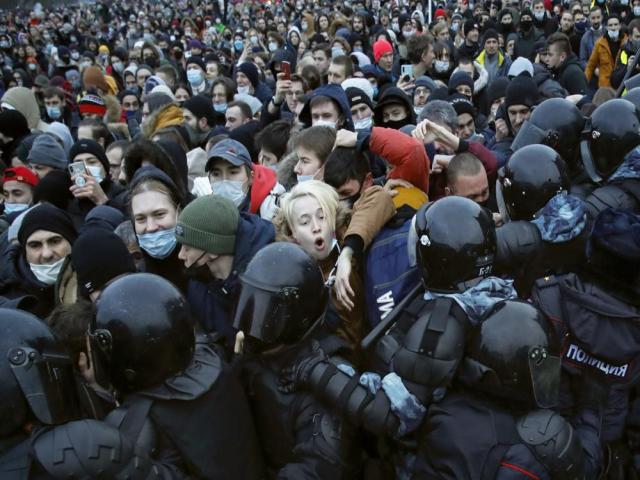Waiting, Fearing, Singing: A Night Sheltering In Ukraine

KYIV, Ukraine (AP) — When the children start crying, the adults start playing Ukrainian folk songs, or make up fairy tales to chase away the fear. Food and water are sometimes scarce. Everyone hopes for peace.
These are the vagaries of life in makeshift shelters around Ukraine, where families try to protect and make conditions bearable for their young and old amid the distant clatter bullets, missiles or shells outside.
Hundreds of thousands of citizens rushed to spend yet another night in Kyiv’s subway network at the howl of air raid sirens overnight Sunday. Among those taking refuge in shelters are some of the Associated Press journalists bearing witness as to how ordinary Ukrainians are coping with the war tearing their country apart, like piano teacher Alla Rutsko.
“A terrible dream … It seems to me that all this is not happening to me. The eyes see, but the mind refuses to believe,” said Rutsko, 37, sitting on an air mattress in Kyiv’s Pecherskaya subway station.
ADVERTISEMENT
“On the fourth night, I can even sleep and dream,” she said. “But waking up is especially hard.”
She focused her thoughts on her grand piano, and her fears of losing it – “an excellent instrument, inherited from my grandfather, survived the last war.”
RUSSIA-UKRAINE WAR
Russia-Ukraine War: What to know as Ukraine resists advance
EXPLAINER: Does Putin’s alert change risk of nuclear war?
500,000+ refugees flee Ukraine since Russia waged war
Europe welcomes Ukrainian refugees — others, less so
The fighting continues to rage in the southeastern Ukrainian city of Mariupol where Ukrainian forces have so far thwarted the Russian military from taking the strategic stronghold on the Azov Sea.
“God forbid that any rockets hit. That’s why we’ve gathered everyone here,” said local volunteer Ervand Tovmasyan, who helped organize a shelter in the basement of a city gym. His young son clung to him.
Workout equipment lining the walls contrasts sharply with the gym’s revised purpose. The shelter has seen shortages in drinking water, food and gasoline for generators since the fighting began last week, so local residents are bringing what they can to stock up.
Many at the shelter remembered shelling in 2014, when Russia-backed separatists briefly captured the city. Anna Delina survived that, and went on to have two children. Now she’s doing the best she can to comfort them with soothing words and caresses as they cuddle under blankets on a cold gym floor.
“Now the same thing is happening, but now we’re with children,” she said.
Countless human moments shaped by war play out across Ukraine.
In Kramatorsk in the country’s east, a couple embraces on a train platform before the woman boards a train heading west, hoping for safety. Refugees slump from exhaustion after crossing into Poland.
While the capital waits for the expected Russian onslaught, the platform at Kyiv’s Pecherskaya subway station where residents sleep is lined with baby carriages interspersed with pet carriers.
At first, authorities barred pets, but then turned a blind eye. Anxious cats and dogs huddle alongside their owners.
ADVERTISEMENT
Denis Shestakov, a 32-year-old architect, made up a fairy tale to ease his 5-year-old daughter Katya’s fears.
“But how can you explain it to a dog? He began to lose his fur from stress,” he said.
“You can get used to a nightmare,” he said, trying to shrug it off. “And this is also a nightmare.”
Despite the shortages, the lack of privacy and all the challenges that come with life on an underground railway platform, complaining comes hard to families.
“It’s much harder for soldiers at the front, it’s embarrassing to complain about the icy floor, drafts and terrible toilets,” said 74-year-old Irina, who would not give her last name. Her grandson Anton is fighting in eastern Ukraine.
The internet mostly works and everyone reads the news. The potential participation of Belarus in the war on the side of Russia has become one of the most discussed topics.
“Oh, Ukrainians, Belarusians and Russians can hardly be called brothers now,” said Dmitro Skorobogaty, 69, an engineer. Then he added, “though you can’t choose your relatives.”
Citizens are constantly warned about Russian saboteurs provoking panic in Kyiv.
Police squads descend into the subway station, check documents, distribute water, and, among other things, advise people whether it’s safe to step out.
Amid the din of parents singing folk songs to their children, foreign students from Africa join with other Ukrainians in singing the melodic national anthem: “Ukraine has not died yet, Glory to Ukraine!”
A flicker of hope is still nurtured by those taking shelter.
“There is hope (for peace negotiations) because everyone wants peace, and some kind of result so that civilians aren’t being killed,” Delina, the mother of two small children said.
Chernov reported from Mariupol, Ukraine.
The ruble slide recalled previous crises. The currency lost much of its value in the early 1990s after the end of the Soviet Union, with inflation and loss of value leading the government to lop three zeros off ruble notes in 1997. Then came a further drop after a 1998 financial crisis in which many depositors lost savings and yet another plunge in 2014 due to falling oil prices and sanctions imposed after Russia seized Ukraine’s Crimea peninsula.
Russia’s central bank immediately moved to try to halt the slide of the ruble. It sharply raised its key interest rate in a desperate attempt to shore up the currency and prevent a run on banks. It also said the Moscow stock exchange would remain closed Monday.

Best And Top Notch Pressure Cleaners
- Searching for an excellent business pressure washer? Look no farther than Jetwave Group. Our tension cleaners

Popular Application Development Trends 2022
- In 2022 and past, certain advancement models will rein the universe of adaptable application movement.

NATO says Russian buildup in Belarus is biggest in 30 years
- NATO Secretary-General Jens Stoltenberg expressed concern Thursday that Russia is continuing its military buildup around Ukraine

Waiting, Fearing, Singing: A Night Sheltering In Ukraine
- The mass exodus of refugees from Ukraine to the eastern edge of the European Union showed no signs of stopping Monday